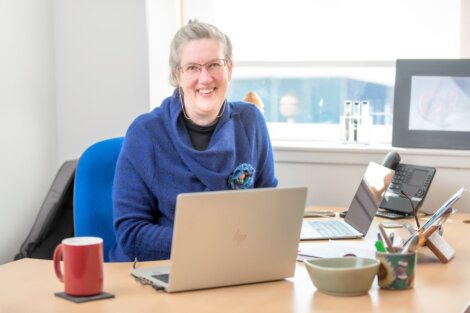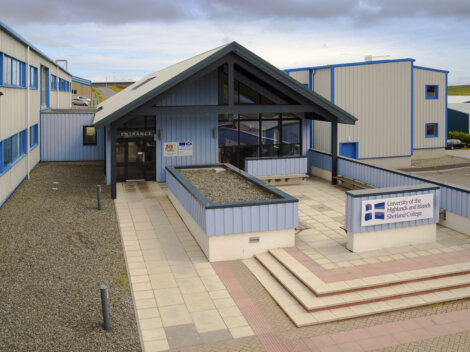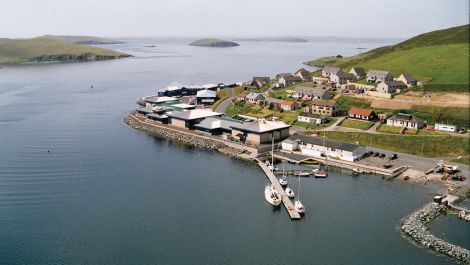Education / College experiencing ‘significant’ reduction in full-time further education enrolments
High employment levels and cost of living pressures are two reasons thought to be behind the drop
THE NUMBER of full-time further education students enrolled at the UHI Shetland college are at their lowest in at least five years – with high local employment and financial pressures thought to be behind the dip.
UHI Shetland principal Professor Jane Lewis said the drop in numbers was a “concern” – but acknowledged it may be part of a wider trend in how people are now accessing education.
Full-time further education enrolment numbers are around 30 per cent down, although apprenticeships continue to do well, and part-time figures are said to be strong compared to last year.
Numbers for full-time further education at the end of September stood at 50, compared to 69 at the same point in 2021 – although numbers vary during the year. The total figure for 2018/19 was 94.
There are much more enrolled part-time when it comes to further education, with 651 on board at the end of September.
Regarding full-time further education Lewis said there appeared to be an ongoing trend over the last five years.
“We’ve seen, not perhaps a direct swap, but an increase in part-time members and a decrease in full-time members,” Lewis said.
“If you think about it in a strategic way, I think what we’re seeing is a change in the way people access education.”
She believes a key factor is the high level of employment in Shetland, meaning some people are going straight into jobs instead of pursuing college education.
There is also the cost of living crisis, which Lewis reckons is drawing more folk to part-time courses so they can work on the side.
One other factor is an apparent increase in the number of people staying on at school instead of moving to college.
“We’ve discussed this at some length, and our thoughts are with high employment which we have here in the isles, and economic pressures – and employment that does not involve particularly qualifications as well…we think that young people and men in particular are just picking up jobs,” Lewis said.
Become a member of Shetland News
“And if families are under pressure, another income has to look very attractive doesn’t it, even if you have to delay your education.”
She also said there is ongoing work with schools to assist senior pupils’ decision-making.
“We think some of that [more people staying on at school] might be down to lost learning in Covid – lack of confidence, all of that sort of thing,” Lewis said.
“And also down to the fact that maybe we didn’t have our offer very clear. What we’ve done is work very hard on the senior phase offer – the S5/S6 offer – and we’re producing a new booklet which I think makes it crystal clear that’s available at college.”
When asked if the drop in full-time further education numbers was a concern, Lewis said: “It would be a concern, because obviously to be a viable college we need to attract as many students as possible.
“But whilst I say it’s a concern, there may be nothing we can do about that, if that’s how education is changing. So what we have to do is change to meet it.
“I rather suspect we’re seeing what’s going to be a long-term national trend.”
The college principal said she does take comfort, however, from improving early withdrawal figures – “students aren’t coming on courses for five minutes and leaving – we’re getting it right from that point of view” – and the continued success of apprenticeships.
The uptake in full-time higher education courses is also countering trends across the Highlands.
With regards to specific courses there are some business ones not running this year, but health and social care remains popular as does the fine art degree course. However, it is hard to pull out trends due to small numbers of students.
It has been more than a year since Shetland College, the NAFC Marine Centre and Train Shetland merged into one organisation under the UHI Shetland name.
The long process was designed to streamline processes while also saving the council – which operated Shetland College and Train Shetland – a significant sum of money.
Lewis said it was a “very tough” merger process, but one that is now bearing fruit.
There has been some restructuring, and the staff headcount has gone down slightly compared to pre-merger.
“We’ve gone from a headcount of 136 to 119 at the end of November,” Lewis said. “But in terms of FTE [full-time equivalent] that’s gone from 115 to 107.
“We had quite a lot of part-time staff. Where possible we would increase somebody’s FTE rather than take on a new member of staff.
“We’re shaping the workforce to what we need through natural processes as far as possible.”
She added that “all of the staff have worked really hard in the first year to come together, and I think we’re making good progress”.
Lewis said there a number of “good news stories” about the college going forward, including its tie-in with the emerging new energy and space industries.
For example it is looking to develop electrical engineering type opportunities to tie into wind energy, and exploring space opportunities.
It also has a hand in a number of projects lined up through the UK and Scottish Governments’ £100 million islands deal, including a campus redevelopment, a ‘talented islands’ programme and the Islands Centre for Net Zero.
Become a member of Shetland News
Shetland News is asking its many readers to consider paying for membership to get additional features and services: -
- Remove non-local ads;
- Bookmark posts to read later;
- Exclusive curated weekly newsletter;
- Hide membership messages;
- Comments open for discussion.
If you appreciate what we do and feel strongly about impartial local journalism, then please become a member of Shetland News by either making a single payment, or setting up a monthly, quarterly or yearly subscription.










































































